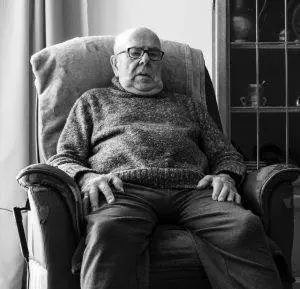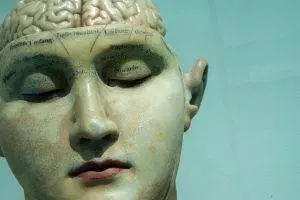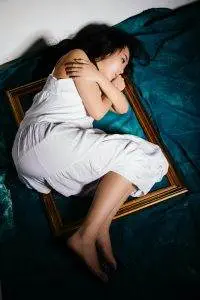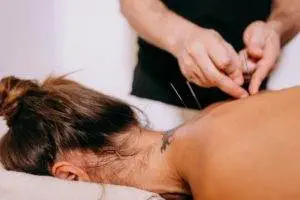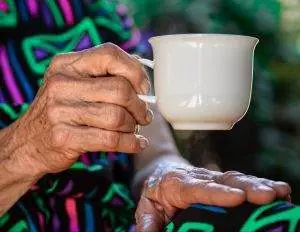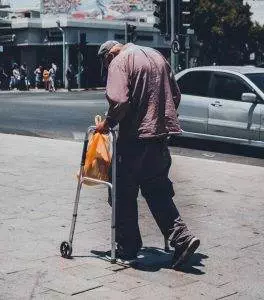By Qineng Tan, L.Ac, Ph.D. & Xiaomei Cai, L.Ac., Ph.D.

Post Traumatic Stress Disorder (PTSD) is a type of mental illness that develops after a person has gone through a traumatic life event. PTSD flashbacks, intrusive thoughts, nightmares, and sleep disorders are a few of the most common signs of PTSD. Acupuncture and TCM are widely accepted as a highly effective way to treat complex PTSD and other stress disorders, as well as anxiety, depression, panic attacks, and insomnia.
PTSD is mostly commonly associated with veterans of the military, as many soldiers who have served in combat experience trauma related to war violence. A significant amount of scientific research and psychiatric study has been devoted to finding out about PTSD and what treatments for PTSD are effective. Relative to other conditions, there have been quite a few studies showing that acupuncture can be helpful for PTSD. The U.S. Navy has even started an acupuncture training program in San Diego, after a Pentagon study showed that TCM is beneficial for veterans.
PTSD is not only a problem for military veterans, though. PTSD can result from all kinds of traumatic life events, including things like: accidents, natural disasters, surgeries, assaults, attacks, abandonment, or the death of a loved one. More than 8 million Americans are currently living with post traumatic stress. People of all ages can experience PTSD. PTSD can result from experiencing something traumatic directly, or being a witness to such an event. People whose jobs involve exposure to violence or disturbing situations, such as first responders, social workers, or police officers, can also have PTSD because of things they have seen. A person can be deeply traumatised by something they didn’t see happen firsthand, but that they heard happened to someone close to them.
The body’s response to extreme stress is one of its ways of protecting us. Stressful situations cause the “fight-or-flight” response and chemicals like adrenaline to be released. When this happens repeatedly, or to an extreme degree, because a person is literally in fear for their life, there can be long-lasting physical and emotional effects. Normal, everyday stress we hope to release from the body through exercise, meditation, laughter, and other stress-reducing activities. But when a person has endured abuse or life-threatening danger, they may not be able to release the stress from their bodies so easily.
TCM theory offers a way to help people deal with mental health issues like PTSD because it creates a context in which emotional and mental symptoms interact with physical symptoms. TCM addresses the way that trauma and negative emotions are stored in the body, sometimes causing overwhelming emotional and physical symptoms. Acupuncture and herbs are holistic treatments for PTSD that can be used as an adjunct to therapy and medications to help relieve stress, sleep problems, mood disorders, negative emotions, and problems with cognitive function.
Top 10 Signs of PTSD

Many people don’t realize that they are experiencing post traumatic stress. PTSD can overlap with several other types of mental health problems, and the symptoms of PTSD can often seem similar to those of other anxiety disorders or symptoms of depression. What PTSD feels like can be highly individual to each person and what caused their initial trauma.
The most commonly recognized symptoms of PTSD include:
- Flashbacks, intrusive thoughts, reliving traumatic events, can’t stop thinking about what happened
- Nightmares, recurrent, vivid, disturbing dreams
- Avoidance of triggering places, activities, or people
- Memory loss, amnesia, unable to remember periods of time related to the traumatic event
- Negative perception of self, negative perception of the world, blaming self or others
- Isolation, unable to connect with other people, relationship problems
- Feelings of anger, irritability
- Hypervigilance, always aware of perceived threat, can’t relax, exaggerated startle response, always on guard, panic attacks
- Difficulty concentrating, inability to focus on the present
- Insomnia, can’t sleep
PTSD often coexists with other mental health issues like anxiety, panic attacks, and depression. Chronic fatigue syndrome (also knowns as ME/CFS)has been associated with PTSD. Fibromyalgia, a syndrome that can cause generalized muscle pain, sleep problems, fatigue, and other problems can be related to PTSD. Sometimes fibro manifests after a traumatic event.
Types of PTSD

The term “stress disorder” refers to a combination of physical and emotional symptoms that are the body’s and mind’s stress responses to some type of trauma.
Different types of stress disorders include:
- Normal stress response – even common everyday work stress and relationship stress can cause widespread health problems. Serious issues like a relationship breakup, or job loss can lead to negative emotions and physical problems due to stress. People of all ages can experience debilitating symptoms of stress like: stomachaches, headaches, trouble concentrating, rapid heartbeat or trouble sleeping. If stress is allowed to build up over time, it can seriously damage health. Past illnesses or viral infections, like Epstein Barr and mononucleosis can also be a factor.
- Acute stress disorders – acute post traumatic stress is the immediate aftereffect of some sort of traumatic event or life-or-death situation. If the short-term (30 days or less) acute signs of trauma are left unaddressed, they can turn into PTSD.
- Uncomplicated PTSD – this refers to PTSD symptoms related to a specific traumatic event, such as a car accident, being the victim of a crime or assault, or surviving a natural disaster and its aftermath. This type of PTSD causes symptoms like: flashbacks, nightmares, avoiding a particular area, thing, or person, and strong feelings of anger, blame, and fear that impact your relationships and sleep patterns.
- Complex PTSD – complex trauma is the result of multiple, repeated traumatic episodes, like suffering abuse as a child, being in an abusive relationship, domestic violence, or repeated sexual abuse. Complex PTSD could also happen to people living in wartime conditions or who are part of a targeted community under brutal conditions. PTSD attacks can be brought on by complex PTSD triggers that remind you of the traumatic events, such as: a particular place or smell, a time of year or date, a physical pain or sensation in a particular part of the body, or reading a story or seeing a movie or TV show that brings up the memory.
- Comorbid PTSD – this refers to PTSD that coexists with other serious issues such as substance abuse, addiction, and/or depression. Comorbid PTSD is very common, because many people suffer from more than one of these mental health conditions at the same time.
In general, complex PTSD and comorbid PTSD are considered more difficult to treat and more likely to affect people throughout their lives than uncomplicated PTSD.
PTSD Treatment
Treatment for PTSD typically involves a combination of psychotherapy/cognitive behavioral therapy (CBT) and psychiatric medications for PTSD such as antidepressants (SSRIs like Zoloft, Prozac, or Paxil) and anti-anxiety medications (like Xanax, Ativan, Valium, or Klonopin). Long-term use of anti-anxiety medications is generally not recommended, as patients can become dependent on them, leading to abuse of the drugs. SSRIs can be helpful for symptoms of depression, but they can also have negative side effects, like sexual dysfunction (ED), weight gain, nausea, dizziness, and making sleep problems worse.

Exposure therapy is a specific type of therapy that helps people learn coping skills by working with the distressing memories or exploring possibly frightening situations in a safe environment with a therapist. Eye movement desensitization and reprocessing (EMDR) helps patients learn to adapt to the stress tied to the past trauma by thinking about it while looking at a movement pattern or listening to a repetitive sound. This treatment has been shown to help PTSD patients heal emotional trauma more quickly than talk therapy or CBT alone.
The conventional treatments for PTSD can help some patients, to different degrees, but many people with complex trauma do not want to go through this type of treatment. Talk therapy, trauma-based CBT, and exposure therapy may be terribly intimidating to people who are suffering with PTSD, and patients may be more afraid of entering into these kinds of therapy than continuing on with their current symptoms.
The TCM modality of acupuncture can have a positive effect on neurotransmitters, the brain chemicals that influence cognitive thought patterns and moods, without the potential negative side effects or dependency that can result from medications. Acupuncture can be a helpful alternative or complementary treatment to other types of therapy for PTSD.
Can Acupuncture Help PTSD?
In historical records of TCM, we do not see a word or description of a condition that is directly synonymous with PTSD. However, in TCM, we view emotional states as being related to the function, or dysfunction, of specific organ systems. The symptoms of PTSD can correlate with these relationships between the organs, the mental state, and physical manifestation of symptoms:
- Lung – Grief – Wheezing, trouble breathing, sweating, fatigue
- Spleen – Worry – Nausea, gastric problems, loss of appetite
- Liver – Anger – Headaches, muscle pain, dizziness
- Heart – Anxiety – Palpitations, insomnia
- Kidney – Fear – Urinary frequency, night sweats, memory problems
A TCM provider will look carefully at how each individual describes their physical symptoms and emotional state, and will choose acupuncture points for PTSD and herbs to help strengthen the organ systems that need nourishment.
In regards specifically to military veterans with PTSD, many survivors are wary of seeking medical or psychological treatment for complex trauma. The majority of soldiers who have served in the Middle East in recent years have been diagnosed with PTSD, but less than half of those veterans are receiving medical treatment for PTSD. Many people, in general, are reluctant to seek care, either because they don’t trust that it will work, or their complicated feelings of shame, guilt, grief, and anger are too overwhelming to share with others.
Acupuncture can be particularly helpful for some people suffering from PTSD because it does not necessarily have to involve talking about the original trauma or abuse. Some patients may avoid psychotherapy for this very reason, as they are not ready, and may never be ready, to go over these details with another person. An acupuncturist can help relieve symptoms of anxiety and depression by focusing on the person’s emotional and physical needs and tailoring the treatment to fit their symptoms and lifestyles.
A clinical study done by the Long Beach V.A. randomly divided patients into “real acupuncture” and “sham acupuncture” groups, and the patients received treatments twice per week over the course of 12 weeks. The veterans who received real acupuncture showed significant physiological improvement, with less startle reactions, as measured by skin sensors, than the sham group.
A Rand review found that acupuncture helped improve symptoms of depression, anxiety, and sleep problems in PTSD patients.
Acupuncture Near Me for PTSD in Los Angeles
It can be a long and challenging process to overcome complex PTSD, but with the right combination of PTSD treatment, it is possible to reduce or even eliminate symptoms. With a TCM approach and acupuncture treatment, we can help reduce anxiety and depression, address feelings of anger and grief in a clinically meaningful way, and help to promote better sleep. If you or a loved one is dealing with unresolved trauma and needs help, you may find that acupuncture is a low-risk and supportive way to treat PTSD.
*This article is for education from the perspective of Traditional Chinese Medicine only. The education provided by this article is not approved by FDA to diagnose, prevent, treat and cure human diseases. It should not stop you from consulting with your physician for your medical conditions. Traditional Chinese Medicine is based on Qi, which is an invisible force that usually cannot be observed by modern science. Because science focuses on testing ideas about the natural world with evidence obtained through observation, these aspects of acupuncture can’t be studied by science. Therefore acupuncture and Chinese herbs are often not supported by double-blind, randomized trials, and they are considered alternative medicine therapies in the United States.




